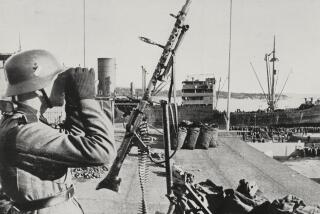Our Sentimental Idealism Booby-Traps a World in Flux
To learn from history is not so easy as usually is made out. One may ask how did we go wrong? The more penetrating question is what were our attitudes that led us to go wrong?
Attitudes are what we preserve after errors are corrected. It is fine to recognize errors, but one has to understand how and why they were made.
Take the case of the North Atlantic Treaty Organization, and what led up to it. We have just observed NATO’s 40th anniversary in an atmosphere of self-congratulation about the wise and resolute way Americans, Canadians and the European allies came together to make a stand against the postwar threat posed by Joseph Stalin.
It was nothing like that. Don Cook, who was there at the time--as correspondent for the old New York Herald Tribune--has just published his account of what really went on among the Western governments between 1945 and 1950, titled “Forging the Alliance.” Americans above all should should read it and reflect--not on how wise we were but how foolish and pompous and misguided, and how lucky we were that it all worked out.
Americans today have mostly forgotten that, as World War II ended, U.S. foreign policy was founded upon a conviction that a new world organization--a world parliament, taking over from the pre-war League of Nations--would guarantee international cooperation. The U.S. government was convinced that American troops would stay in Europe a year or two at most, to “de-Nazify” Germany. This was what Congress and the public expected and wanted.
Security, power, national rivalries--these were held to be discredited factors in international relations. Any policy based on considerations of military security and national interest was held to represent the way of thinking that had already produced two world wars.
It must be understood that it was not just Franklin D. Roosevelt who thought this way. His were the beliefs of a generation of Americans active in public life. The British complained (in Anthony Eden’s words) that they were about to be left by the United States “alone to share the cage with the bear.” Washington saw Stalin as an awkward fellow but one who could be “babied along” and who would eventually see that cooperation was essential in the postwar world.
Americans thought Britain and France the problem countries. British and French imperialism and Britain’s concern about postwar European power relations seemed to them to pose a greater threat to stability than Stalin. The unspeakably silly Joseph E. Davies, former U.S. ambassador to Moscow, reported from London in 1945 that Winston Churchill “was basically moreconcerned over preserving England’s position in Europe than in preserving peace”--and this communication was endorsed by Admiral William D. Leahy, chief of staff to both Roosevelt and Harry S. Truman, with a comment, “This is consistent with our staff estimates of Churchill’s attitude throughout the war.”
The United States was hostile to Britain’s interventions to support the Belgian and Greek governments against left-wing attempts to take power. Harry Truman himself refused to allow American troops to join British and New Zealand forces advancing on Trieste, to block Josip Tito from taking that Italian city.
There is much more to the story. The point is that the U.S. government and public alike believed in a policy based on a fundamentally sentimental idealism. They relied on unreciprocated gestures of good will toward Stalin because they believed that American principles were so manifestly right that Stalin would be won over.
They were ignorant of the Soviet Union but didn’t care. The American specialists on Russia, George Kennan and Charles Bohlen among them, were the best in the world at the time, and repeatedly but vainly tried to explain to Washington what Stalin and his regime were like. No one listened.
Washington preferred to dismantle Europe’s empires. Roosevelt told China’s Chiang Kai-shek to be ready to take over Indochina--”the French have forfeited their right to it by neglect.” Even so subtle and intelligent an American as the critic Edmund Wilson, while reporting from postwar Europe for the New Yorker, asked why “little sections of Europe, like Italy--why should anyone take them seriously as countries?”
By 1949 good sense prevailed, thanks largely to Britain’s leadership. America will not make the same errors again. It will make other errors. I suspect that we have heard a little too often George Santayana’s remark about those who have not learned history being compelled to repeat it. Thus the war in Vietnam, where Washington thought it was avoiding “another Munich.” The trouble was that Ho Chi Minh and Mao Tse-tung were not Hitlers, and Vietnam was not Germany.
To avoid the errors of the past it is necessary to understand why they were made, not just what they were. Why did people think that way? Do we still think in the same way--with equivalent prejudices, preconceptions adjusted to the 1990s, the same confidence in the natural preeminence of American values and the natural superiority of the American outlook? NATO was a success, against odds. Will we make a success of what comes next? The answer should not be taken for granted.
More to Read
Sign up for our Book Club newsletter
Get the latest news, events and more from the Los Angeles Times Book Club, and help us get L.A. reading and talking.
You may occasionally receive promotional content from the Los Angeles Times.







